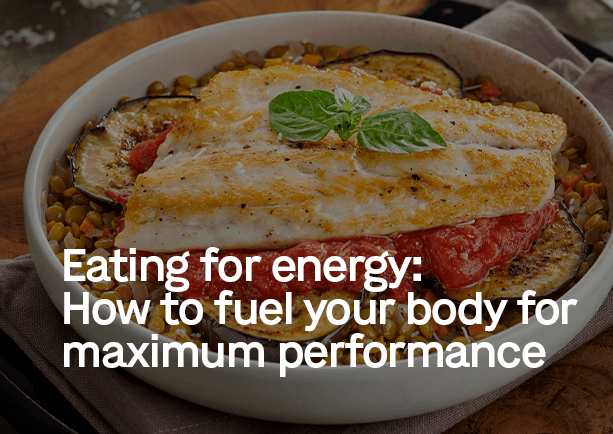Eating for energy: How to fuel your body for maximum performance

Food is fuel for your body, much like high-octane gasoline powers a sports car. Just as you need quality fuel for optimal performance in your V8, your body relies on the right foods to function at its best. Whether an athlete, a student, or simply aiming for a productive day, maintaining a healthy diet is key to feeling energized and focused.
Your diet is crucial in determining your energy levels and overall performance. To achieve the best results, paying attention to your food's quality and how you process it is essential. This article delves into valuable tips and tricks for nourishing your body with fitness-focused foods and maximizing your performance potential.
This article will delve into valuable tips and techniques for incorporating fitness food into your diet and fueling your body for optimal performance.
What You Eat matters!
Discover the art of optimal nutrition and unlock your body's full potential. It's not just about the ingredients you consume but also understanding the inherent nutrients within food and how you consume it.
By choosing nourishing energy foods for the body, such as lean proteins, whole grains, and fruits like oranges, you can boost your stamina and focus, keeping yourself powered up throughout the day.
Here, we present a selection of essential practices to unlock the utmost potential from your dietary choices, enabling you to achieve optimal performance.
Eat a balanced diet.
Carbohydrates fuel our bodies, serving as the primary source of energy. To maintain a healthy diet, it's crucial to incorporate complex carbs like whole grains, fruits, and vegetables. However, striking the right balance of other macronutrients is equally essential. Proteins are vital in muscle repair and growth, while fats support cell structure and brain function.
A protein-rich diet is essential for children and pregnant women, as it promotes healthy growth and development. You can ensure a well-rounded and nourishing diet by including diverse foods abundant in these macronutrients.
It's worth noting that excessive reliance on carbohydrates can hinder fat burning, potentially leading to obesity. Embrace a balanced approach to fueling your body and unlock the path to optimal health and vitality.
Choose nutrient-dense foods
In addition to carbohydrates, proteins, and fats, our bodies rely on a wide array of vitamins and minerals for optimal functioning. To fuel your body with essential micronutrients, it's crucial to incorporate nutrient-dense foods like leafy greens, nuts, seeds, and berries into your diet.
These power-packed ingredients not only enhance energy levels but also promote overall health.
Steer clear of processed and refined foods that offer little nutritional value and are often packed with empty calories. Instead, prioritize fresh ingredients whenever possible. Frozen foods may undergo significant nutrient loss, while processed foods may lack essential nutrients.
Consider incorporating organ meats into your meals to enrich your fitness food further. Organ meats are a treasure trove of minerals such as iron, zinc, magnesium, selenium, and vitamins A, B12, D, E, and K.
Time your meals
Timing your meals strategically is a powerful tool for unlocking optimal performance and reaping additional benefits. It's not just about what you eat, but also when you eat. By eating smaller, frequent meals throughout the day, you can maintain a steady stream of energy and avoid energy crashes.
Consume a well-balanced meal or snack every 3-4 hours to energize your body. Alternatively, you might explore the concept of intermittent fasting, where you have two meals spaced eight hours apart and then fast for 16 hours. This approach can aid in shedding those extra pounds while revitalizing your body and enhancing nutrient absorption.
Stay Hydrated
Water is the elixir of life, playing a crucial role in maintaining optimal energy levels. With 60 percent of our bodies comprised of water, even mild dehydration can lead to fatigue and diminished mental and physical performance.
This precious resource replenishes our bodily fluids, which
are constantly depleted through activities like breathing and sweating. Water ensures smooth digestion, lubricates our joints, spinal cord, and tissues, and prevents overheating.
Moreover, water serves as a vital catalyst in breaking down the food we consume, facilitating the absorption of essential nutrients. Make it a habit to drink at least 8-10 glasses of water daily, increasing intake during physical activity or in hot weather.
Fuel up before and after exercise.
Preparing your body for physical exertion requires proper fueling, ensuring you have the energy to power through workouts and sports activities. To maximize performance, consume a nutritious meal a few hours before exercise, supplying your body with the necessary energy. Opt for easily digestible foods like bananas, granola bars, or refreshing smoothies packed with carbohydrates and proteins.
Equally important is providing your body with essential nutrients for muscle repair, growth, and recovery. Within 30 minutes post-workout, indulge in a nourishing meal combining protein and carbohydrates. Consider a revitalizing protein shake, a delightful cup of Greek yogurt with fresh fruits, or a satisfying turkey sandwich.
Other than Food
In addition to maintaining a balanced and nutritious diet, two crucial factors influence how your body utilizes food.
Get enough sleep
According to experts who understand its vital role, sufficient sleep is the cornerstone of a healthy lifestyle. Restful slumber is essential for supporting bodily functions and achieving peak performance. The consequences of sleep deprivation can be severe, leading to fatigue, impaired mental and physical abilities, and an increased risk of injury. Moreover, prolonged lack of sleep can contribute to weight gain and negate the benefits of nutritious meals.
Renowned athletes such as Usain Bolt and Roger Federer prioritize sleep, dedicating 10-12 hours to daily restorative rest. Aim to obtain a minimum of 7-8 hours of sleep and establish a consistent sleep routine to synchronize your body's internal clock. Eating foods rich in melatonin, such as kiwis and fatty fish, as part of your evening meal, can enhance sleep quality.
Exercise regularly
A solid exercise regimen is the ultimate supplement to unlock the full potential of your nutrient intake. Exercise plays a pivotal role in sustaining energy levels and optimizing performance.
By engaging in regular physical activity, you can bolster stamina, enhance cardiovascular health, and elevate various bodily functions. Moreover, exercise catalyzes fortifying the digestive system, alleviating stress, and maintaining healthy body weight.
Devoting just 30 minutes to regular physical activities, such as brisk walking, cycling, or swimming, on most days of the week is sufficient to reap the rewards of your balanced diet. The harmonious combination of a wholesome diet and regular exercise also helps regulate sugar levels and blood pressure, offering long-term benefits that extend well into the future.
Conclusion
Several factors come into play to achieve maximum performance from your dietary choices. Timely meal consumption is just as crucial as selecting the right foods.
Additionally, ensuring an ample water intake and obtaining sufficient sleep carry equal significance. The optimal approach involves maintaining a balanced diet of fresh ingredients and exercising regularly to capitalize on these factors fully.
FAQs
1. Which foods are rich in energy?
Foods rich in energy and nutrition include fruits (such as bananas, apples, oranges, and berries), nuts and seeds (like almonds, walnuts, chia seeds, and flaxseeds), whole grains (such as quinoa, brown rice, oats, and whole wheat bread), lean proteins (like chicken breast, fish, tofu, and legumes), and healthy fats (including avocado, olive oil, and nuts like almonds and cashews). Including these foods promotes energy, nutrition, and overall health.
2. What is the most high-energy food?
Fats are typically considered the most high-energy food. They provide the highest calorie content per gram compared to carbohydrates and proteins. Nevertheless, it is crucial to acknowledge that a well-balanced diet should encompass a diverse range of foods to fulfil all nutritional requirements.
3. How can I increase my energy level?
To increase energy levels, focus on a healthy diet and lifestyle. Eat balanced meals with nutrient-dense foods, stay hydrated, control portion sizes, limit processed foods, exercise regularly, get enough sleep, and manage stress. Everyone's energy needs differ, so listen to your body and seek professional advice.
Trending Searches:
Meal Plan Dubai | Affordable Meal Plans Abu Dhabi | Meal Plan Ajman | Meal Plan Al In | Meal Plan Sharjah | Meal Plan Subscription
Related Blogs
The Burnout Diet
Jan 30, 2026 | 8The mental load of “What should I eat today?"
Jan 22, 2026 | 8The real glow-up starts with your gut health
Jan 14, 2026 | 8Healthy food that doesn’t taste like “Diet Food”
Jan 17, 2026 | 8Why do most people in the UAE get their calories wrong
Dec 8, 2025 | 6DASH Diet Meal Plan
Nov 11, 2025 | 8Fatty Liver Meal Plan
Oct 31, 2025 | 8Pregnancy Diet Meal Plan
Oct 27, 2025 | 82000 Calorie Meal Plan
Oct 1, 2025 | 8Intermittent Fasting Diet Plan
Sep 5, 2025 | 8






